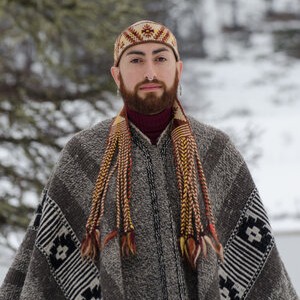Créditos: Sebastián Riffo Valdebenito.
In his sixteenth-century book-length letter to the king of Spain, the Indigenous Quechua author, Guaman Poma de Ayala, states that he did not understand the Spaniards’ obsession with gold, hypothesizing that it must be because they in fact eat the gold. Silvia Rivera Cusicanqui (2018) has subsequently argued that this was evidence not only that the Indigenous Andean world perceived the Spaniards as “not human,” but that Spanish colonization represented “the collapse of the idea of the human” (65).
This is similar to Eduardo Viveiros de Castro’s (2004) thesis that the cosmologies of Europe and Abya Yala were marked by two conflicting definitions of what constituted “the human,” as well as the now repeated observation that the human/nature binary is a Western construct with no language outside the West containing such a conceptualization (Mignolo and Walsh 2018). In this sense, colonization signifies the armed imposition of a certain concept of “the human” over and above other understandings, cosmologies, and epistemologies.
Currently, despite its pointed critiques of the limitations of humanist perspectives, the frequent attempts of many posthuman analyses to overcome the limitations of humanism from within Western epistemologies—without consulting other interrogations of ‘the human’—is to continue this tradition of overriding alternative engagements with the (post-)human. “Posthumanism” ironically becomes an extension and rearticulation of humanism’s coloniality.
This panel is interested in a posthuman relationality otherwise than that found within discourses emerging from within Western epistemologies. What ecological consciousnesses, for example, exist outside the dominant scientific ecology, a scientific discipline with a long history of collaborating with colonial expansion and occupation? What mestizo ecologies, cyborgs, and post-humans exist in the literature emerging from Latin America? How do Indigenous conceptions of relationality and the human respond to Western conceptions? How does the gendered construction of ‘the human’ figure into these posthumanisms?
¡Turpü gelayay konkülenaliyiñ iñchiñ! / Never again without us!
Antonio Catrileo; Manuel Carrión-Lira
Through our artistic practice we have explored other possibilities that go beyond identities and sexuality. We are a community of epupillan (two-spirit) beings, that means that from the Mapuche rakizuam (epistemology), we are beings that can overflow from our humanity to make relationships with itrofilmongen (biodiversity). Our practice then is both a critique of anthropocentrism and heteropatriarchy and an affirmation of multiple forms of life, love and being. We will present some of our works that explore poetics through political imagination as a possibility to thrive amidst silence and historical omission within our own Mapuche history. Our artistic practice is also a practice of creative memory in honor of our non-heterosexual ancestors (machi weye) who had a political-spiritual role in our communities in the precolonial past but also seeking to transform the intergenerational trauma into a celebration that unsettles the neoliberal multicultural settler colonial politics of recognition. Is it possible to break the linear anthropocentric time of the production and reproduction of life? Epupillan is a generative practice of refusal to flourish and thrive instead of survival practice embedded in tolerance.

Antonio Catrileo
Mapuche writer, artist, and weaver from Pikunmapu/Qullasuyu (Curico,Chile). Currently is a student at the PhD in Ethnic Studies at the University of California San Diego. They hold a B.A., M.A. in Chilean and Hispanic Literature at Pontificia Universidad Católica de Valparaíso.
Author of the book “Awkan epupillan mew: dos espíritus en divergencia” (2019) and “Diáspora”(2015). Member of the Catrileo+Carrión Community, where they have collectively published the books “Poyewün Nütramkan Pikunmapu/Qullasuyu” (2020), “Poyewün witral: bitácora de las tejedoras de Neltume” (2019), “Torcer la palabra: escrituras obrera-feministas” (2018) and “Yikalay pu zomo Lafkenmapu” (2018).
Currently is a collaborator of Global Center for Advanced Studies Latin America Collective. Their work is presented as a critical intervention in how colonial categories have been imposed on notions of sexuality and gender in the Mapuche context.
Catrileo claims the word epupillan (two-spirit) as a generative practice that focuses on not reproducing the damage of the archive’s narratives in order to imagine a Mapuche futurity beyond the politics of recognition, nation, and identity. Epupillan is a situated knowledge shared by several elders who are HIV/AIDS activists and defenders of the land.

Manuel Carrión Lira
Pikunche researcher, video-artist and curator from Pikunmapu/Qullasuyu (Quillota, Chile). They are currently a Fulbright International Fellow studying in the PhD in Literature at the University of California San Diego. Manuel holds a M.A. in Latin American Art, Thought and Culture from the Instituto de Estudios Avanzados at Universidad de Santiago de Chile, and a B.A. in Design at Universidad de Valparaiso.
Member of the Catrileo+Carrión Community, where they have collectively published the books “Poyewün Nütramkan Pikunmapu/Qullasuyu” (2020), “Poyewün witral: bitácora de las tejedoras de Neltume” (2019), “Torcer la palabra: escrituras obrera-feministas” (2018) and “Yikalay pu zomo Lafkenmapu” (2018). Manuel is part of the Global Center for Advanced Studies Latin America Collective.
Manuel’s work focuses on Indigenous Media at the intersection with Trans-indigenous/Transnational kinship networks to track down how Indigeneity and Indigenous identity circulates beyond nation-state borders, all of this with special attention to queer/trans Indigenous cultural production.
Decolonial Love of the Body/Land in the Poetry of Natalie Díaz, Daniela Catrileo, and María Isabel Lara Millapan
Allison Ramay
This presentation focuses on the poetry of three poets writing from the vast territories of Abya Yala: Natalie Díaz (Mojave and Latina; California, U.S.), Daniela Catrileo (Mapuche; Santiago, Chile) and María Isabel Lara Millapán (Mapuche; Villarrica, Chile). All three poets use the written word to describe land-territories that cannot fully sustain their need for “home”. Their poetic bodies, however, become crucial channels for creating a language capable of expressing alternative forms of love of self, community, and land. In this presentation I approach the three poets’ language creations through Inés Hernández-Ávila’s notion of “the sovereign word” and indigenous feminist praxis which, as Mishuana Goeman states, “connects humans, nonhumans and land as symbiotic relationships”. In this scenario, I propose that all three poetics aspire toward a symbiotic relationship to the land and that this manifests primarily through their reformulation of their bodies in relationship to that land.

Allison Ramay
Profesora Asociada de Literatura en la Facultad de Letras, Universidad Católica de Chile e investigadora adjunta en el Centro de Estudios Interculturales e Indígenas (CIIR).
Sus publicaciones se enfocan en la poesía mapuche, la historia mapuche, y la interculturalidad. Actualmente está investigando el activismo de mujeres mapuche durante la primera mitad del siglo XX. Dicta cursos de pregrado y posgrado sobre teorías culturales (interseccionalidad, postcolonialismo, estudios de género) y World Literature.
Es editora de la revista English Studies in Latin America: A Journal of Cultural and Literary Criticism. (http://esla.letras.uc.cl/) aramaya@uc.cl
Mapuche Restitution and Chilean Settler Metonymy
Ethan Madarieta
This paper argues that Mapuche demands for restitution are the material and mnemonic undoing of Settler metonymy and its basis in the specific substitutive logic of colonial object relations which constitute the limits of “the human.” The ongoing Chilean and global capitalist dispossessions are at the core a rupture of Mapuche constitutive ecological relations that exceed this colonial conception. These dispossessions are an effect of a continuous and morphing Settler metonymy, a layered paradigmatic substitution, whereby possession and dominion over the Indigenous body as “indio,” “native,” or “indigenous” is possession and dominion over land as “territory,” “resource,” and “nation”. This Settler metonymy is the direct corporeal and discursive violence against the Mapuche by the Chilean Settler state through myriad eliminative practices enabled by this colonial substitutive logic. In response to this violence, many Mapuche are calling for territorial restitution, a practical and conceptual framework that signals a proper relationship between People and land (relational ontology), which I distinguish from state conceptions of territorial sovereignty and “the human.”

Dr. Ethan Madarieta
Ph.D. in Comparative Literature from the University of Illinois at Urbana-Champaign in 2020. His current book manuscript, tentatively titled The Body is (Not) the Land: Memory, Translation, and Territorial Aporias, focuses on the material and discursive assertions of presence and territorial precedence of the Mapuche Indigenous peoples who live in their territories in what are commonly known as Chile and Argentina, and across an urban and global diaspora.
Focused on the local but relevant to planetary Indigenous struggles for sovereignty and autonomy, the project thinks across transcontinental Indigenous knowledges through textual, psycholinguistic, and political memorial performances such as the ongoing Mapuche hunger strikes.
Madarieta’s essays have appeared or are forthcoming in Critical Times, Latin American Theatre Review, A Contracorriente, English Language Notes, and in the Bloomsbury Academic Press edited collections Critical Memory Studies and #MeToo and Literary Studies.
Destabilizing Western Heuristics: The Limits of Allegory, Animal, and Agency in Ixcanul
Sarah Bey West; Cristina Zhunio
We here take as our point of departure the interrogation of the “human” as constructed via Western philosophy and worldviews. Through an exploration of María, the protagonist of the 2015 film Ixcanul, we attend to how the central themes of academic exploration—specifically, those of María’s agency and the film as allegory—both reify Western epistemologies while also impossibilizing María’s liberation from Western notions of gender, sexuality, race, and class. To do this, we take up intellectual routes offered by Vanessa Watts and Confluencia Nuevo B’aqtun, among others, that destabilize the axiomatized human in order to provide a re-reading of key scenes that demonstrate María’s capacity otherwise. Through this framework, we experience moments in which María moves through her world not to find or exert agency (Rocha 2020)—rather, she complicates the human/nature divide and its subsequent hierarchization. This allows for a demand for alternatives to allegorization via, for example, her relationality to what in the west are (non-human) “animals.” This framework also allows us to experience María’s so-called silence as a resounding refusal (Audra Simpson) to the terms of audience engagement, and not as a marker of passivity/agency as previous intellectual conclusions have established (Alfaro Córdoba 2018, Rocha).

Dra. Sarah Bey West
The research and intellectual production of Sarah Bey West, PhD, is focused on breaking away from traditional approaches to the study and engagement of the “Latin American” literary and cultural canon.
Their work is organized around theoretical frameworks—specifically, those with roots in abolitionist, decolonial and trans feminisms—that question and challenge the always already colonial, cisheteronormative underpinnings of gender, class and race relations.
Their forthcoming book, “Caste War Textualities” is a rereading of Yucatán’s nineteenth-century textual register that emphasizes how the concept of race war mobilized the transference of colonial oppression into liberal state-building.
They also teach courses on contemporary Yucatec Maya “literature”, US Spanish-language “im/migration” literature, and feminist theory. They currently serve at the rank of Assistant Professor; is core faculty in Gender, Women’s and Sexuality Studies; and is affiliated faculty in Latinx and Latin American Studies at Northeastern Illinois University in Chicago.

Cristina Zhunio
Cristina Zhunio is completing her master’s degree in Latin American literatures and cultures at Northeastern Illinois University.
Working alongside Dr. Bey West for the last two years, she has been approaching indigenous textualities through decolonial feminisms and otherwise perspectives.
Organiza

Maxwell Woods
Desarrolló su Doctorado en Literatura Comparada con una especialización en Literatura Latinoamericana y en Literatura Universal en la Universidad de Wisconsin, Madison. Sus proyectos de investigación estudian principalmente la interrelación entre la decolonialidad, la literatura moderna y los estudios urbanos. Otras líneas de investigación incluyen los estudios punk, las representaciones de insurrecciones y los estudios ambientales.
En 2020, Woods publicó su primer libro, Politics of the Dunes: Poetry, Architecture, and Coloniality at the Open City sobre la visión decolonial de la Ciudad Abierta de Ritoque.
Su trabajo se ha publicado en Cultural Politics, Cultural Dynamics, Literary Geographies, Modernity/Modernism, Social and Cultural Geography, Cultural Studies, LIT: Literature Interpretation Theory y Revista COTA.
Proyectos de investigación nacional e internacional:
Actualmente, Woods está co-organizando una serie de seminarios sobre la traducción de la epopyea, Amereida, al inglés.
